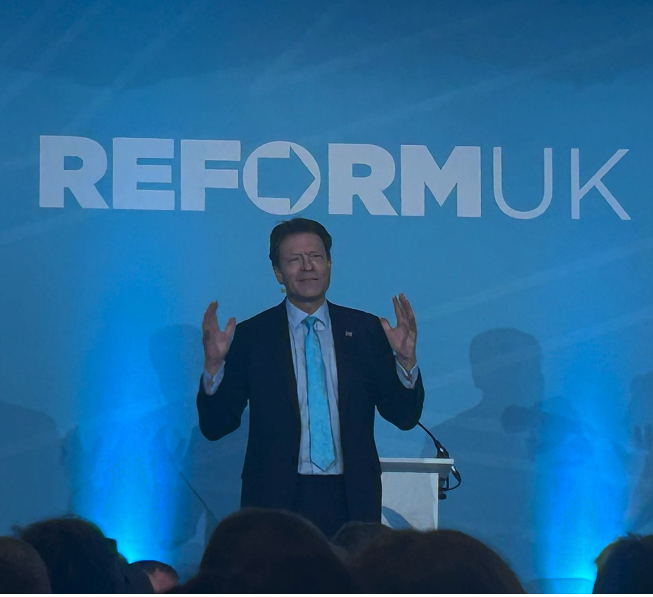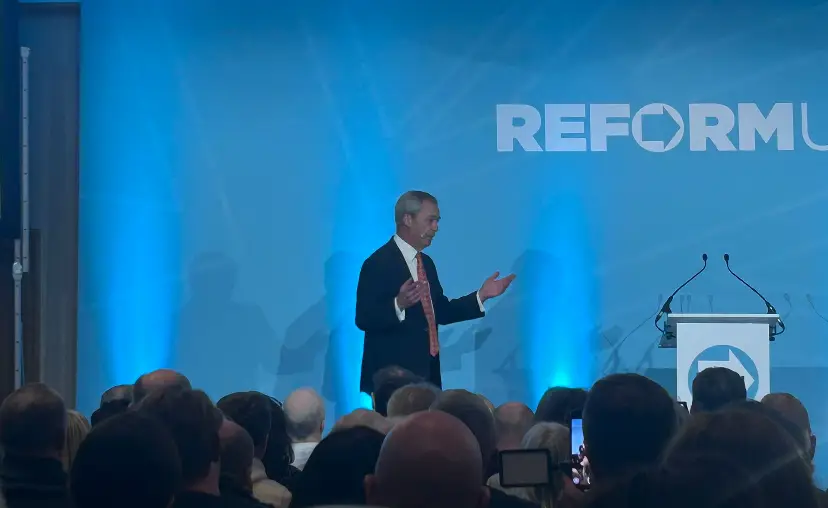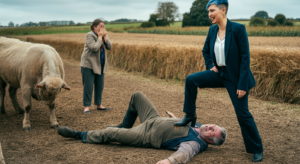I have never felt the need to get involved in politics, least of all to actually attend a party-political conference, but here I was travelling to Chester in the ice and cold of January 11th, not knowing what to expect or even how to dress. I can, however, describe the conference in just a few adjectives: inspirational; informative; upbeat; passionate; enlightening. But I would add two nouns: Heartbreak and Anger. I’ll deal with the heartbreak and anger later. First, let’s look at the positives.
Inspirational
American political rallies inspired the upbeat tempo and format, I suppose. The conference delegates included, young and old, some more formally dressed and others less so. Despite the American influence, I was glad there were no turquoise Reform Logo placards or Nigel Farage faces or outsized foam hands waving in the crowd as this would have upset my terribly English sensibilities.
…a firebrand opening from Zia Yusuf, Reform Party Chair

The initial speakers all created and maintained this buoyant atmosphere with a firebrand opening from Zia Yusuf, Reform Party Chair, and was maintained by the following speakers. These included three Prospective Parliamentary Candidates (PPC) for Reform; a Reform UK Councillor and a Reform UK county organiser.
The focus was on Lancashire, where County Council elections are likely to take place in May 2025. I found it all relatable and useful despite coming from outside the county. These candidates and speakers had an in-depth knowledge of their own areas, and although there were some national themes, I learned a fair bit about solid policies.
Informative
It is often levelled at Reform, particularly personally at its leader, that the party is good at criticising the things which the previous and the current Government were and are getting wrong, but “don’t have any policies of their own.”
…clear ideas on how to release empty housing stock back into the market.
What was obvious is that Reform has well thought out plans on many of the issues facing us in the UK. Major topics and policies are covered in “Our Contract with You” document. This is the Reform version of a manifesto, highlighting the break with traditional politics. For ease, I will refer to this as “the Contract.”
Take Housing as an example. In the Contract, Reform acknowledges there is a Housing Crisis, but speakers vocalised clear ideas on how to release empty housing stock back into the market. They spoke about the reform needed in the planning system and gave suggestions on opening available building opportunities including brownfield sites.
As an example, TfL has identified of the total 5,700 acres it owns, there is land that can be used for development, and has plans to build housing and commercial space on 300 acres of that land.

There are many other Services which also own unused land which could be brought into house production more easily.
Looking at TfL, my own research shows that a safe benchmark for the number of houses that can be built on a developable acre of land is 12–14. However, the number of houses that can be built on a given piece of land depends on several factors, including:
• Location: How well the land is connected to an existing settlement
• Landscape: The more sensitive the landscape, the greater the impact of development.
That is over 3500 houses which might be produced from TfL land alone.
The second issue of Landscape emphasised the need for reforms in the planning process, citing the High Speed 2 (HS2) project’s expenditure of over £100 million on a bat “shed” in Buckinghamshire as a case in point.
- Purpose: The curved structure is designed to enable bats to fly safely over the planned rail route.
- Location: The shed spans approximately 0.6 miles alongside Sheephouse Wood.
Cost: Over £100 million has been allocated to this single project feature. - Backlash: Critics have labelled the expenditure a sign of mismanagement, questioning the rationale behind such a high cost, particularly given the lack of evidence that high-speed trains pose a threat to bats.
- Planning Process: Securing planning permission from Buckinghamshire Council proved challenging. HS2 Ltd reportedly spent hundreds of thousands of pounds on legal and environmental experts to obtain the necessary approvals.
This example highlights the complexities and potential inefficiencies within the current planning system, raising calls for meaningful reform of the planning system. It highlights Government mismanagement and planning gone mad. Reform address this in the Contract by pledging savings on wasteful Government spending.
there were interesting ideas about how to use the Royal Navy to stop illegal channel crossings
Border and immigration
Border and Immigration issues which affect us nationally were also discussed and along with pledges to break from the ECHR there were interesting ideas about how to use the Royal Navy to stop illegal channel crossings together with deportation for any of those who have come illegally who commit crime whilst here. We now have some stats thanks to Reform MP questions and research on crime committed by nationality in the UK.
For example: Albanians are disproportionately represented in the UK prison population, making up a higher percentage of foreign prisoners than any other nationality.
In 2020, Albanians made up over 1,500 of the UK’s foreign prisoners, representing about 10% of the total. By June 2022, the number of Albanian prisoners had dropped to 1,336, but they still made up 14% of the foreign prison population.
Nor is it just Albanians, the statistics on crime involving Afghans in the UK are also alarming and disproportionate.
- Arrest rate: According to the Telegraph, Afghans have the second highest arrest rate for foreign nationals in the UK, with 106.9 arrests per 1,000 people.
- Terrorism: Between 2002 and 2019, 15,934 people of Afghan nationality were convicted of terrorism-related offences.
- Sex Abuse: One Afghan asylum-seeker was convicted in the Rochdale child sex abuse ring.
The UK and Scottish governments do not publish statistics on crimes committed by people seeking asylum or who have settled refugee status. Why?
Reform UK vow to end visas for applicants for persons applying from countries with a high representation in crime in the UK especially where crimes against women and children are highlighted.

Upbeat & Passionate
Despite some topics, all speakers, not just those known nationally, were upbeat and passionate about winning seats and changing the face of UK politics.
They showed determination in this to commit to fighting on from the beach-head of the five Reform MPs already established, through County Council Elections and on to the next General Election.
Heartbreak and Anger
Whilst all other speakers were receiving rapturous applause, healthy interjections and generating a buzz in the room, one speaker brought the conference into complete and utter silence.
…[the] content brought tears and horror to the conference as she outlined her story.
That speaker was Elizabeth Harper, whose quiet manner and speech content brought flurry of mixed emotions to Reform delegates as she outlined her horrific ordeal. We sat in silence overwhelmed by horror, bitter anger and tears.
Elizabeth Harper stands as a beacon of resilience and courage, a survivor of the Rotherham grooming scandal—the largest and most harrowing case of its kind in the nation’s history so far uncovered. Rising above unimaginable adversity, Elizabeth has become a tireless advocate and change-maker in the fight against child sexual exploitation (CSE).
Today, she collaborates with social workers, youth workers, and politicians to safeguard vulnerable children and to aid those whose lives have been irrevocably scarred by such exploitation. Her dedication extends to public speaking and volunteer work, where she provides invaluable one-to-one support for at-risk children and those in care.

In 2016, Elizabeth’s vision and determination led to the creation of a groundbreaking initiative that trained prominent businesses in Rotherham to recognise the signs of CSE. This pioneering project, funded by the Police Crime Commissioner, brought together organisations such as Costa, KFC, and McDonald’s—key gathering spots for vulnerable teenagers. As the first program of its kind, it set a powerful precedent for community vigilance and corporate responsibility.
…she continues to bring light to a dark chapter in history and to pave the way for a safer, more compassionate future for children everywhere.
Elizabeth Harper’s work is nothing short of heroic. Through her unwavering commitment, she continues to bring light to a dark chapter in history and to pave the way for a safer, more compassionate future for children everywhere.
Elizabeth told the story of how she was abducted off the street by a woman who imprisoned her and later trafficked her for sex. She outlines all of this in her book “Snatched: Trapped by a Woman to Be Sold to Men”. The Anger I describe rose up in me when she highlighted not only the trauma of her abuse and suffering at the hands of the perpetrator, but that the only person who has been convicted during her ordeal was her own dad. Her father was arrested for trying to free her from her illegal imprisonment.
The anger in me was compounded by the fact that Labour Government voted against a National Enquiry into the Rape Gangs. It’s reasoning: we already have the Jay Report. What the Prime Minister and Jess Phillips refer to is IICSA: report of the Independent Inquiry into Child Sexual Abuse.
Charlie Peters highlights through his research that more than 50 towns could have rape gang victims.
The final report of the Independent Inquiry into Child Sexual Abuse (IICSA), chaired by Professor Alexis Jay.
This Jay Report had a much broader scope on the subject, mentions Rotherham only once across the report, and GB News reporter Charlie Peters highlights through his research that more than 50 towns could have rape gang victims. The Jay inquiry estimated that there may be 1,400 victims in Rotherham. This would put the number of young white working-class girls (although the victims included boys) affected by these gangs in the tens of thousands. The report states that social isolation and fear of dishonour prevented Asian victims from coming forward who may have also been involved.
I would dare to suggest that these reasons also help to keep white victims from speaking out to accuse their attackers, and that cultural community suppression by families is possibly why Asian victims are not identified.
Worse of all, the grooming and rape is almost certainly still going on and only a national enquiry will uncover the truth. Only a national enquiry will hold those to account who did not act for a fear of “increasing racial tension” including: social workers; police; local councillors and other agencies. Until then, Elizabeth and the thousands of survivors like her will not see any justice.

Enlightening
The latter session of the conference was packed with lucid and knowledgeable speakers, including Matt Goodwin, an expert in polling and political matters.
Lee Anderson, who was mixing in the refreshment area pre-conference, was both illuminating and very humorous. A mix of northern charm, good humour and sound political experience makes him almost invulnerable and extremely likeable.
Richard Tice followed, highlighting the error of Net Zero and bringing international language comprehension with the word “Dunkelflaute.” Dunkelflaute is a German term that refers to a period when there is little or no wind or sunlight, making it difficult to generate energy from renewable sources. The term translates to “dark wind lull” or “dark doldrums”.
It was only last week when we had such an occurrence in the UK when on January 8th, 2025, Great Britain narrowly avoided a blackout on what proved to be the most critical day for the electricity market since 2011.
During the evening peak, wind power generation was limited to just 2.5 GW, solar production was predictably zero, and significant interconnector outages further strained the system, leaving the expected available capacity at a precarious 5.7 GW.
The situation was so fragile that losing even a single large power station could have caused demand control measures, underscoring the precarious balance of supply and demand on that day. This marks the first winter in which the newly nationalised grid operator, the National Energy System Operator (Neso) has been responsible for meeting the country’s energy demand without relying on coal power. It came within a hair’s breadth of failure.
Neso reported a need for an additional 1,700 megawatts of power-generating capacity to maintain the electricity supply within its usual safety margins for homes and businesses. This shortfall, highlighted by Neso on Tuesday evening, is equivalent to the output of two to three gas-fired power plants or enough electricity to supply approximately 850,000 homes.
By Wednesday morning, fossil-fuel gas power accounted for 53% of the electricity generated in Great Britain, while wind power contributed 18%, according to data from Neso. Nuclear reactors provided 12% of the UK’s electricity, biomass burners supplied 6%, and the remainder was imported at huge cost.

What the whole episode highlights is that the UK is way-off reliance on fossil-fuels and the only way it can be achieved is by implementing Modular Nuclear Reactor power production. These are relatively easy to build in terms of footprint, and more secure as we could have them dispersed nationally.
As it was, we had to purchase emergency power supplies from the Nuclear fed grid in France at emergency prices.
Finally, Nigel Farage hit the stage, albeit straight after Elizabeth and in a very sombre mood, calling for a National Enquiry for her and many other victims’ behalf. He proposed we should fund one if the Labour Government does not buckle under the pressure.
Mr Farage opened about Our Contract with You, and more importantly, about the democratisation of the Party.
Latterly Reform UK has been a Limited Liability company with shareholders Nigel Farage and Richard Tice. This form of company structure allowed Mr Farage, with controlling shares, to stand down Brexit Party candidates against Conservative candidates in the 2019 General Election. Boris Johnson, in discussion with Nigel Farage, agreed to “Get Brexit Done.” Regardless of whether this may have been the right thing to do, subsequent failures mean that it is imperative we take action to grasp the opportunities of Brexit. This includes Northern Ireland, abandoned by implementing the Windsor Framework. He emphasised the Reform Contract pledges to abandon the framework itself as it is worse than the original Northern Ireland Protocol. It is a result of the Windsor Framework that the UK has been partitioned down the Irish Sea.

Mr Farage told the conference that the party structure was being changed, and that this was now with the Electoral Commission, and that members will have a more democratic party going forward. This is the major reason Ben Habib and Nigel Farage parted ways. Ben has been an outspoken and commanding speaker supporting Reform, who insisted on this change before he can consider backing the party in the future.
Alluding to more militant sectors of the Right, Mr Farage reaffirmed his position that the Reform Party is no place for those with the motivation of hate, reiterating that there is “no place in the party” for such factions.
Nigel closed the conference with a darts reference informing the delegates with the visual aid of a dartboard that the Reform Party had reached 180,000 members. At the time of writing on Monday after the conference, membership is indeed 181,370 strong.
Conclusion
I would encourage everyone interested in change to both join the Reform Party and attend the next conference available and nearby.
The main reason for me is that with every turn, the Labour Government has hurt the Country, its economy and its people with intended or unintended consequences, and I was fast falling into despair.
The Reform Conference in Chester has lifted me out of that mindset, given me hope and a reason to actively support Reform and the changes it will bring about when elected.






